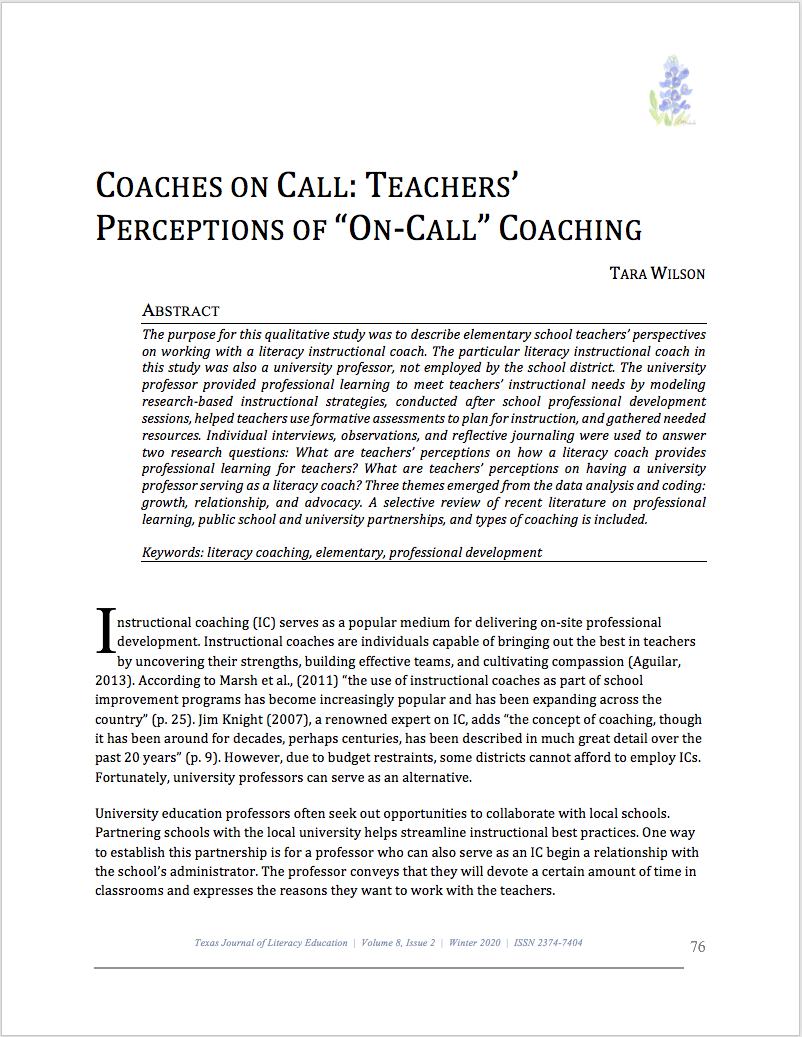Coaches on Call
Teachers’ Perceptions of "On-Call" Literacy Coaching
Keywords:
literacy coaching, elementary, professional developmentAbstract
The purpose for this qualitative study was to describe elementary school teachers’ perspectives on working with a literacy instructional coach. The particular literacy instructional coach in this study was also a university professor, not employed by the school district. The university professor provided professional learning to meet instructional needs of teachers by modeling research-based instructional strategies, conducted after school professional developments, helped teachers use formative assessments to plan for instruction, and gathered needed resources. Individual interviews, observations, and reflective journaling were used to answer two research questions: What are teachers’ perceptions on how a literacy coach provides professional learning for teachers? What are teachers’ perceptions on having a university professor serving as a literacy coach? Data analysis was achieved by coding. The themes that emerged from the data were: growth, relationship and advocacy.
A selective review of recent literature on professional learning, public school and university partnerships, and types of coaching is included.
References
Aguilar, E. (2013). The art of coaching: Effective strategies for school transformation. Jossey-Bass.
Bartholomew, S., & Sandholtz, J. (2009). Competing views of teaching in a school-university partnership. Teaching and Teacher Education, 25(1), 155-165.
Beach, D., McAdams, L., Becker, M., Gentry, J., Larmer, B., & Miller, J. (2015). Public school-University partnerships: A model for effective professional development. In S. Garrett & K. Fleming (Eds.), Education: Issues and Answers (pp. 1-12). CEDER.
Bernard, H. R., & Ryan, G. W. (2010). Analyzing qualitative data: Systematic approaches. Sage.
Creswell, J. (2013). Qualitative inquiry and research design. Sage.
Frerichs, S.W., Fenton, M.S., & Wingert, K. (2018). A model for out-of-school educator professional learning. Adult Learning 29(3). 115-122.
International Literacy Association (2017). Standards for the preparation of literacy professionals. Library of Congress.
Knapp, M.S. (2003). Professional development as a policy pathway. In R.E. Floden (Ed.), Review of research in education (pgs. 109-158). American Educational Research Association.
Knight, J. (2007). Instructional coaching: a partnership to improving instruction. Sage.
Marsh, J., McCombs, J., & Martorell, F. (2011). Policy implementation and effects in Florida middle schools how instructional coaches support data-driven decision making. Educational Policy, 24, 872-907.
Miles, M. B., Huberman, A. M., & Saldana, J. (2014). Qualitative data analysis: A methods sourcebook (3rd ed.). Sage.
Moustakas, C. (1994). Phenomenological research methods. Sage.
Parker, M., Templin, T., & Setiawan, C. (2012). What has been learned from school-university partnerships. Journal of Physical Education, Recreation & Dance, 83(9), 32-36.
Patton, M. Q. (2002). Qualitative research methods & evaluation research (3rd ed.). Sage.
Schensul, J. J. (2012). Methodology, methods, and tools in qualitative research. In S. D Lapan, M. T. Quartroli, & E. J. Riemer, (Eds.), (2012). Qualitative research (pp. 69-103). Jossey-Bass.
Smith, E., Kindall, H.D., Carter, V., & Beachner, M. (2016). Impact of adopt-a-classroom partnerships between K-12 and university faculty. School Community Journal, 26(1),163-181.
Strauss, A., & Corbin, J. (1998). Basics of qualitative research: Techniques and procedures for developing grounded theory (2nd ed.). Sage.
Teras, H. & Kartoglu, U. (2017). A Grounded theory of professional learning in an authentic online professional development. International Review of Research in Open and Distributed Learning, 18 (7), 192-212.
Webster-Wright, A. (2010). Authentic professional learning: Making a difference through learning at work. Springer.
Wertz, F. J. (2005). Phenomenological research methods for counseling psychology. Journal of Counseling Psychology, 52, 157-177.
Yin, R. K. (2011). Qualitative research from start to finish. Guilford Press.

Downloads
Published
Issue
Section
License
All copyright remains with the author.

